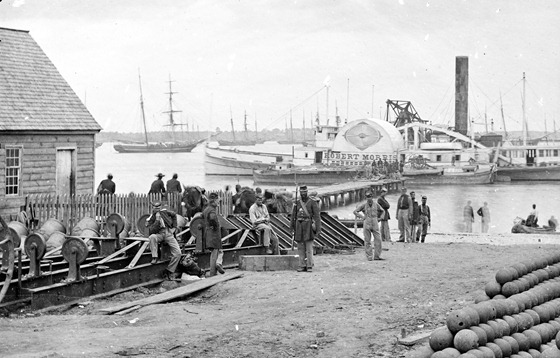Written from the Sea islands of South Carolina.
Monday, May 19, 1862.
[Diary]
Our men have returned from Hilton Head and nearly all are eager to go there again and serve in the forts, though Marcus says he does not wish to fight, but only to learn to fight. . . .
Very much has occurred lately, but I have no time to write. I have received and distributed twenty-one boxes of clothing, having sold over $155 worth and sent out fifteen boxes to the plantations, which will be sold on account or given away. . . . People have come from great distances to buy here and seem almost crazy at the sight of clothes — willing to pay any price.
We have had to refuse to sell, being so overworked. I am sorry to say that I have discovered two cases of pilfering, and the cotton house has been entered again and again, we think, but nothing that we can miss is taken. Our house-servants are honest as the day.
Mr. French spent Saturday night and preached here on Sunday. He thinks good times are coming for us. He says that General Saxton[1] will be our friend, and that we shall have the military in our favor instead of against us as before. The danger now seems to be — not that we shall be called enthusiasts, abolitionists, philanthropists, but cotton agents, negro-drivers, oppressors. The mischief has been that on this side of the water, on these islands, the gentlemen have been determined to make the negroes show what they can do in the way of cotton, unwhipped. But they have only changed the mode of compulsion. They force men to prove they are fit to be free men by holding a tyrant’s power over them. Almost every one who has attempted this has failed. Those who have not attempted driving are loved and obeyed. On the rationed islands, Port Royal and Edisto, the negroes have worked much better and have been perfectly contented.
Last Saturday the provisions from Philadelphia were distributed, and I heard our folks singing until late, just as they did after their first payment of wages, only then they sang till morning.
Thorp was here the other night. He wanted Mr. Pierce to let him stay in his present position for a time, for Mr. P. had wanted to remove him. He pleaded so that Mr. P. yielded and Mr. T. went back to work, but he is now ill and Sumner is taking his place in the distribution of clothes and food. This has not yet been begun and the people are gloomy. Last Sunday Ria, of Gab. Capers, came over to me and asked me to speak to Mr. Pierce about her horse. Mr. Saulsbury, a cotton agent, had taken away a fine horse (belonging to the estate), which Ria took care of and used, and in its place he gave her an old beast to take her to church, as she is paralytic. She came to church and heard that Mr. Eustis, the provost marshal, who had made a law that no negro should ride any horse without a pass, was going to take away the horses of all the negroes who had come to church without a pass. She appealed to Mr. Pierce. He sent her to Mr. Park. She is afraid of Mr. Park and appealed to me. Park was there and I went directly to him. He heard me, and smiled as if a little pleased to be petitioned, came forward and promised the woman a pass or permission hereafter to use the horse. The Mr. Field, a sutler and friend of the Whitneys, who was here a few days ago, told me he had found a fine horse on the island named Fanny — a thoroughbred, which he meant to take North with him. As Ria’s good horse’s name was Fanny and he was probably one of Saulsbury’s gleanings, I think we can see how the negroes have been wronged in every way. Last Sunday Mrs. Whiting asked me to accept a quarter of lamb. I offered to buy it and we had it for dinner. Afterwards Mrs. W. told me she had no more right to the lamb than I had, that she took it from the estate, had it killed and generously gave me part. I told her of the strict military order against it, when she said Government agents had a right to kill, and that Mr. Mack and others did so. Mr. Pierce instantly wrote to Mr. Mack to ask if he had done this thing. Mr. Whiting has not been a Government agent for two months, and yet he lives in Government property, making the negroes work without pay for him and living upon “the fat of the lamb,” — selling too, the sugar, etc., at rates most wicked, such as brown sugar, twenty-five cents a pound; using Government horses and carriages, furniture, corn, garden vegetables, etc. It is too bad. The cotton agents, many of them, are doing this.








 May 19—The battery was reorganized to-day, officers elected, and non-commissioned officers appointed.
May 19—The battery was reorganized to-day, officers elected, and non-commissioned officers appointed. Near Corinth, Miss., May 19 ,1862.
Near Corinth, Miss., May 19 ,1862.
